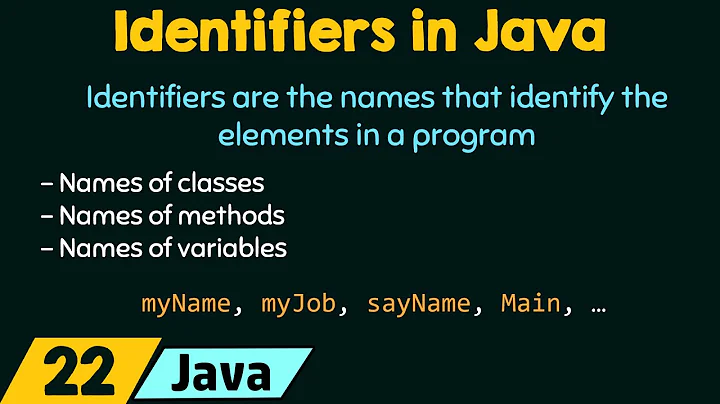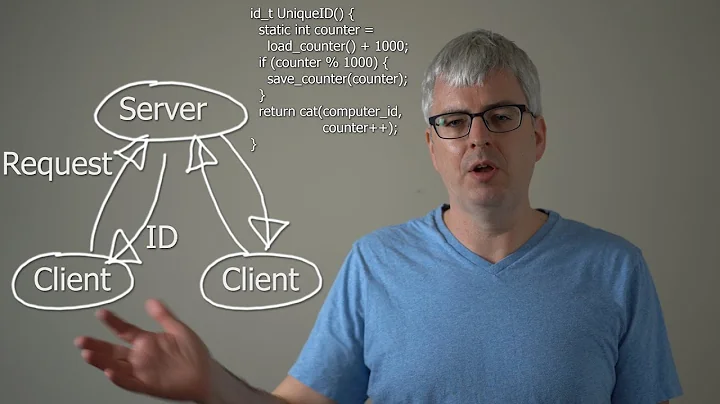Generating a globally unique identifier in Java
Solution 1
Pretty sure UUIDs are "good enough". There are 340,282,366,920,938,463,463,374,607,431,770,000,000 UUIDs available.
http://www.wilybeagle.com/guid_store/guid_explain.htm
"To put these numbers into perspective, one's annual risk of being hit by a meteorite is estimated to be one chance in 17 billion, that means the probability is about 0.00000000006 (6 × 10−11), equivalent to the odds of creating a few tens of trillions of UUIDs in a year and having one duplicate. In other words, only after generating 1 billion UUIDs every second for the next 100 years, the probability of creating just one duplicate would be about 50%. The probability of one duplicate would be about 50% if every person on earth owns 600 million UUIDs"
http://en.wikipedia.org/wiki/Universally_Unique_Identifier
Solution 2
public class UniqueID {
private static long startTime = System.currentTimeMillis();
private static long id;
public static synchronized String getUniqueID() {
return "id." + startTime + "." + id++;
}
}
Solution 3
If it needs to be unique per PC: you could probably use (System.currentTimeMillis() << 4) | (staticCounter++ & 15) or something like that.
That would allow you to generate 16 per ms. If you need more, shift by 5 and and it with 31...
if it needs to be unique across multiple PCs, you should also combine in your primary network card's MAC address.
edit: to clarify
private static int staticCounter=0;
private final int nBits=4;
public long getUnique() {
return (currentTimeMillis() << nBits) | (staticCounter++ & 2^nBits-1);
}
and change nBits to the square root of the largest number you should need to generate per ms.
It will eventually roll over. Probably 20 years or something with nBits at 4.
Related videos on Youtube
Comments
-
 Julie almost 2 years
Julie almost 2 yearsSummary: I'm developing a persistent Java web application, and I need to make sure that all resources I persist have globally unique identifiers to prevent duplicates.
The Fine Print:
- I'm not using an RDBMS, so I don't have any fancy sequence generators (such as the one provided by Oracle)
- I'd like it to be fast, preferably all in memory - I'd rather not have to open up a file and increment some value
- It needs to be thread safe (I'm anticipating that only one JVM at a time will need to generate IDs)
- There needs to be consistency across instantiations of the JVM. If the server shuts down and starts up, the ID generator shouldn't re-generate the same IDs it generated in previous instantiations (or at least the chance has to be really, really slim - I anticipate many millions of presisted resources)
- I have seen the examples in the EJB unique ID pattern article. They won't work for me (I'd rather not rely solely on System.currentTimeMillis() because we'll be persisting multiple resources per millisecond).
- I have looked at the answers proposed in this question. My concern about them is, what is the chance that I will get a duplicate ID over time? I'm intrigued by the suggestion to use java.util.UUID for a UUID, but again, the chances of a duplicate need to be infinitesimally small.
- I'm using JDK6
-
 Julie over 15 yearsNice reference! So its safe to infer that if I use UUID.randomUUID() in my application, the chance of it generating the same UUID twice is infinitesimally small then...?
Julie over 15 yearsNice reference! So its safe to infer that if I use UUID.randomUUID() in my application, the chance of it generating the same UUID twice is infinitesimally small then...? -
 Julie over 15 yearsWell, just because there are so many possible values, doesn't necessarily mean that they wrote the algorithm well enough to get a good random distribution. Then again, the designers of the UUID class have probably put a lot more thought into it than I could in an afternoon!
Julie over 15 yearsWell, just because there are so many possible values, doesn't necessarily mean that they wrote the algorithm well enough to get a good random distribution. Then again, the designers of the UUID class have probably put a lot more thought into it than I could in an afternoon! -
Shawn Miller over 15 yearsyep, quite a bit of thought went into it... "Standardized by the Open Software Foundation (OSF) as part of the Distributed Computing Environment (DCE)"
-
 Julie over 15 yearsThat's a clever way to go about it. I think I'll trust the UUID class, as @smiller has given me more confidence that it's "unique enough."
Julie over 15 yearsThat's a clever way to go about it. I think I'll trust the UUID class, as @smiller has given me more confidence that it's "unique enough." -
rmeador over 15 yearsMy company uses a system very similar to this for generating our "UUIDs". It works ok (I've never seen a duplicate). It seems really hacky though, and also it allows you to figure out where and when something was created.
-
Michael Burr over 15 yearsWhile you're up at night worrying about that duplicate UUID, be sure to keep an eye open for that meteorite... ;)
-
 Julie over 15 yearsNice and simple solution, yes. The UUID bit of code will probably be the most called in my application, by many threads at once, so the synchronization overhead/bottleneck may be too much.
Julie over 15 yearsNice and simple solution, yes. The UUID bit of code will probably be the most called in my application, by many threads at once, so the synchronization overhead/bottleneck may be too much. -
Bill K over 15 yearsIt is hacky in that I was limiting myself to a long. If you simply used two longs and appended a count to the currentTime in a synchronized method, it won't fail unless your clock changes. If you are worried about that, it would be trivial to fix too.
-
user unknown over 12 yearsWhy do you create 2 new Random objects?
-
Mike Samuel over 12 yearsDon't roll your own UUID code. There are a lot of subtle ways to get it wrong. This code will do bad things if multiple processes start in the same millisecond, such as when you start a batch of machines running the same task at the same time.
-
 Basil Bourque over 10 yearsA Version 1 UUID is preferable, using MAC address + current time + a random number. The java.util.UUID class bundled with Java does not generate Version 1 presumably because of security & privacy concerns. The Wikipedia page on UUID Implementations lists 2 libraries that generate Version 1. But entirely-random (v4) is generally good enough if generated with a "cryptographically strong" randomizer (as in the bundled class).
Basil Bourque over 10 yearsA Version 1 UUID is preferable, using MAC address + current time + a random number. The java.util.UUID class bundled with Java does not generate Version 1 presumably because of security & privacy concerns. The Wikipedia page on UUID Implementations lists 2 libraries that generate Version 1. But entirely-random (v4) is generally good enough if generated with a "cryptographically strong" randomizer (as in the bundled class).







